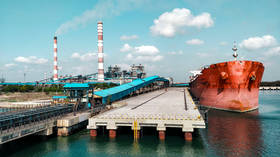Russian share of Indian oil imports soaring – data

India’s imports of Russian crude surged by 80% year-on-year in September, after a drop during the summer months, news outlet the Financial Express reported on Monday.
New Delhi bought an average of 1.56 million barrels per day (bpd) of Russia’s Urals oil last month, compared to 865,000 bpd in the same period last year, according to vessel-tracking data from Vortexa. On a monthly basis, September imports were up by 8% from August.
Separate data from Kpler showed that India’s total crude shipments from Russia reached 1.8 million bpd last month, compared to 977,000 bpd a year ago.
“Indian refiners have been tacitly lamenting about Urals trading at $4 per barrel to Brent on a delivered basis, however given the robust pull on Russian crude from China, the differentials on Russian barrels will not be coming down anytime soon. Urals at that price is still $6 a barrel lower than anything term-supplied from the Middle East,” said Viktor Katona, lead crude analyst at Kpler.
According to Katona, India will continue to ramp up imports of Russian crude even at elevated prices in the upcoming winter season, given the continuing Russian ban on diesel and gasoline exports and the higher costs of Middle Eastern oil.
“I think India will stick to its September levels of buying further on, importing 1.8-1.9 million barrels a day,” Katona told the Financial Express, adding that “for Indian buyers the question is how much more could they buy, not how much less.”
This indicates that even with shrinking discounts, Russian oil remains affordable for Indian refiners, unlike Saudi crude.
Saudi Arabia exported about 506,000 bpd of oil to India in September, sharply lower than 855,000 bpd in August, data from Vortexa showed. In year-on-year terms, Indian imports from Saudi Arabia slumped by almost 45% from 918,000 bpd in September 2022.
Experts say that declining crude shipments from Riyadh, once one of India’s major crude suppliers, can be attributed to increased costs of Saudi Arabian oil after the country announced an extension of its voluntary production cut until December.
For more stories on economy & finance visit RT's business section













